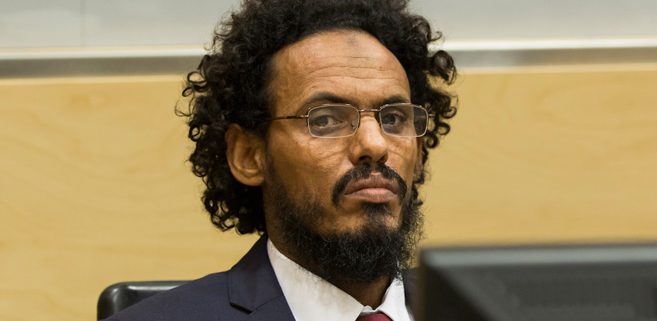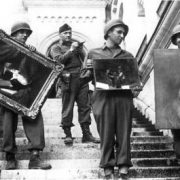Ahmad Al Faqi Al Mahdi pleads guilty – Trial is held this week
by Fiana Gantheret
As mentioned here on Creating Rights, on 1st March 2016, the Pre-Trial Chamber I of the International Criminal Court held the confirmation of charges hearing in the case The Prosecutor v. Ahmad Al Faqi Al Mahdi. On 24 March 2016, it issued its Decision on the confirmation of charges against Ahmad Al Faqi Al Mahdi, in which it confirmed the war crime charge regarding the destruction of historical and religious monuments in Timbuktu (Mali). The Pre-Trial Chamber found that the evidence presented by the Prosecutor is sufficient to establish substantial grounds to believe that Mr Al Mahdi is criminally responsible, pursuant to article 25(3)(a) (perpetration and co-perpetration); article 25(3)(b) (soliciting, inducing); article 25(3) (c) (aiding, abetting or otherwise assisting) or article 25(3) (d) (contributing in any other way) of the Rome Statute, for the commission of a war crime regarding intentionally directing attacks against the following buildings:
1) the mausoleum Sidi Mahamoud Ben Omar Mohamed Aquit, 2) the mausoleum Sheikh Mohamed Mahmoud Al Arawani, 3) the mausoleum Sheikh Sidi Mokhtar Ben Sidi Muhammad Ben Sheikh Alkabir, 4) the mausoleum Alpha Moya, 5) the mausoleum Sheikh Sidi Ahmed Ben Amar Arragadi, 6) the mausoleum Sheikh Muhammad El Mikki, 7) the mausoleum Sheikh Abdoul Kassim Attouaty, 8) the mausoleum Ahmed Fulane, 9) the mausoleum Bahaber Babadié, and 10) Sidi Yahia mosque (the door).*
The confirmed charge concerns a crime allegedly committed in Timbuktu between around 30 June 2012 and around 11 July 2012. From January 2012, a non-international armed conflict broke out in the territory of Mali, and led to different armed groups taking control of the north of the country. It is alleged that Mr Al Mahdi, born in Agoune, 100 kilometres west of Timbuktu, Mali, was an active personality in the context of the occupation of Timbuktu. He allegedly was a member of Ansar Eddine, a mainly Tuareg movement associated with Al Qaeda in the Islamic Maghreb (“AQIM”), working closely with the leaders of the two armed groups that took control of Timbuktu, Ansar Dine and AQIM. During the ten months occupation period, the two groups imposed their will in Timbuktu through a local government, which included an Islamic tribunal, a morality brigade (Hisbah), and an Islamic police force. It is alleged that, until September 2012, he was the head of the Hisbah. In addition to his role as head of the Hisbah, It is alleged that Al Mahdi was very active in other structures such as the Islamic Tribunal, and oversaw the execution of its decisions. It is alleged that he was involved in the destruction of the buildings mentioned in the charge, as it was decided by the leaders of Ansar Dine and AQIM.
The Chamber also indicated that these buildings were cherished by the community, were used for religious practices, constituted an important part of the historical heritage of Timbuktu, and embodied the identity of the city, known as the “Pearl of the Desert” and the “City of 333 Saints”. As such, they did not constitute military objectives. They were specifically identified, chosen and targeted precisely in light and because of their religious and historical character. As a consequence of the attack, they were either completely destroyed or severely damaged.
Al Mahdi pleaded guilty this morning, as announced at the confirmation of charges hearing of 1 March 2016.The Trial will be held before Trial Chamber VIII, composed of Judge Raul C. Pangalangan (Presiding Judge), Judge Antoine Kesia-Mbe Mindua, and Judge Bertram Schmitt. The international Judges put questions to the accused, as foreseen in the Rome Statute, concerning the voluntary aspect of his admission of guilt, his awareness of the charges brought against him and of the possible sentence that might be decided.
Al Mahdi then made a short statement, in which he apologized to the ancestors that built the monuments and promised the people of Timbuktu that he will never engage in such acts ever again. He reminded them to he was a son of Mali that had lost his way and that he was part of the “social fabrique” of Timbuktu in that he also contributed to the life of the country. He stated that he had been influenced by groups, and warned the Muslims of the world that they should stay away from such acts from which no good can come for humanity.
As explained on the ICC website, the Office of the Prosecutor will have three hours to present its case and a maximum of nine hours for the examination of its three witnesses who are staff members or experts. The Legal Representative of victims will then have one hour to present their views and concerns, and the Defence will have a one hour and a half to present submissions.
This morning, the Prosecutor Fatou Bensouda addressed the attack on the identity of the people of Mali that was carried out through the destruction of the buildings. She defined these mausoleums as physical embodiment of Mali’s historical development. She also insisted on the significance of these attacks for the entire humankind, and the necessity of fighting against the revisionist goal of these attacks. The restructuration of the cultural heritage and the recognition of the crime of their destruction will help the reconciliation process taking place in the post-conflict phase. Finally, she emphasized that historical, religious and cultural heritage is no luxury and is necessary to the development of humanity.
You can follow the proceedings here.
* With regard the names of the religious and cultural sites, I will be grateful if anyone has information regarding the accuracy of their spelling.






